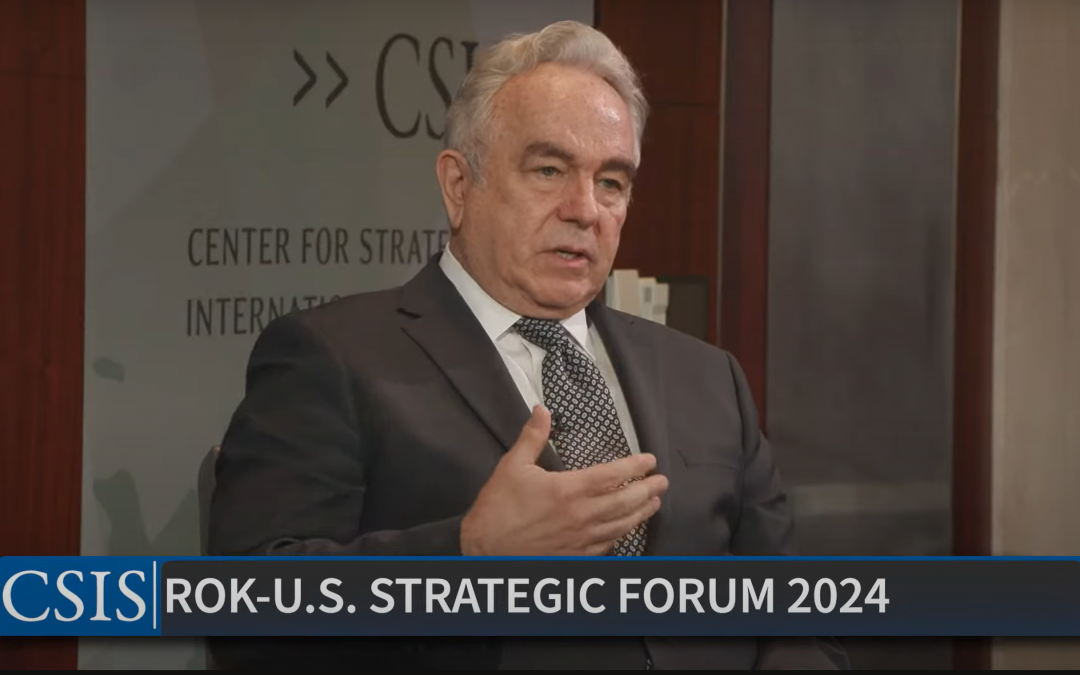WASHINGTON — Top U.S. and South Korean national security officials and experts addressed the biggest issues facing their alliance at the ROK-U.S. Strategic Forum Monday, with the recent deployment of North Korean troops to Russia in focus.
The speakers discussed the denuclearization of the Democratic People’s Republic of Korea, or the DPRK, and the region’s role in the Russo-Ukrainian War. The forum also addressed goals for the trilateral partnership between the U.S., South Korea and Japan, as well as the possibility that South Korea could join the G7.
The event was co-hosted by the Korea Foundation and the Center for Strategic & International Studies.
Authoritarian Convergence
Experts agreed that the aggression exhibited by China, Iran, North Korea and Russia was the forefront issue the ROK-U.S. alliance should focus on. The group is often dubbed the “axis of upheaval” by U.S.-based foreign policy analysts for their efforts in opposing Western-led international order and the autocratic leadership that their governments arguably share in common.
Speakers expressed concern about the news that around 11,000 North Korean troops entered the battlefield in Kursk on Monday, demonstrating that the DPRK is co-belligerent with Russia.
“This is a dangerous strategic gamble by Kim Jong Un,” Park Jin, the Former Republic of Korea Minister of Foreign Affairs, said at the panel. Park said he believes North Korea is hoping to receive advanced military technology from Russia in return, including nuclear submarine technology and airfighters.
Park also reiterated a necessity for the DPRK to denuclearize in order to avoid two hostile states on the Korean peninsula.
“We should send a very strong message together, between the U.S., Korea, Japan and other countries, to make sure that North Korea can come back to the right position,” Park said. “If not, then we will strengthen our sanctions on North Korea.”
Andrea Kendall-Taylor, Senior Fellow and Director for the Transatlantic Security Program at Center for a New American Security, said there is also a worry that Russia could help Iran acquire nuclear weapons.
“Now that Moscow has shed its concern over being a responsible global actor, it is less constrained now in its actions than it has been in the past, and is even more likely to aid the Iranian regime,” Taylor said.
In his keynote remarks, U.S. Deputy Secretary of State Kurt Campbell said that he believes China may be trying to distance itself from the collaboration between North Korea and Russia.
“They are concerned that Russian encouragement may cause the DPRK to contemplate either actions or military developments that are not in China’s interests,” Campbell said.
U.S.-Korea-Japan Trilateral Partnership
Panelists vocalized that the most pressing issues the U.S.-Korea-Japan trilateral partnership needed to tackle were Taiwan and the South China Sea, as well as the growing nuclear arsenal of China, Russia and the DPRK.
On Nov. 15, the White House announced in a joint statement with Japan and the Republic of Korea that they would be establishing a Trilateral Secretariat in order to ensure the partnership is “built to last.” In their statement, they condemned the DPRK and Russia for expanding a “war of aggression against Ukraine,” and China’s “unlawful maritime claims in the South China Sea,” which refers to China’s claim of Taiwan as part of its territory.
However, a common concern among the panelists was that the three countries would prioritize their individual ties with one another over the interests of the group.
For instance, the South Korean public is dissatisfied with the Japanese government’s lack of acknowledgement over its occupation of their home country during World War II, which could destabilize ties between South Korea and Japan, according to Former First Vice Minister of the Republic of Korea Shin Kak-soo.
Katrin Fraser Katz, an adjunct fellow at CSIS Korea Chair, recommended that President Trump continue to favor trilateral cooperation over bilateral dealings.
“The U.S. is facing an axis that’s growing,” Katz said. “Do we want to face that alone, or do we want to face that with a strong network? It’s up to him. Does he want to win?”
Global Governance (G7)
Lee Shin-hwa, a professor in the Department of Political Science and International Relations at Korea University, said she hopes to see more discussion facilitated about the Korean peninsula during the next G7 summit in June 2025, especially around North Korea’s human rights violations and denuclearization.
Panelists also considered the possibility of adding South Korea to the G7.
“Korea can contribute significantly to the expansion and strengthening of the democratic international order. This is a very important reason for Korea to join the G7 as a country that cherishes the importance of democracy, more than any other country,” said Park, who also spoke at the Authoritarian Convergence panel.
Meanwhile, some panelists criticized the G20 for being too diffuse to achieve outcomes, especially because of the vast amount of contradicting interests the countries within the alliance have.
“An institution with China, Russia and others, we’re probably not going to solve some of the most critical problems facing the democratic world,” Clete Willems, a G7/G20 Sherpa during the first Trump administration, said. “The G7 has a lot more potential.”

